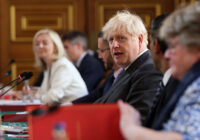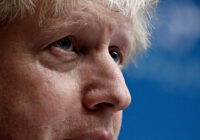Ironically, it is the relentless attacks on Muslims that are creating a more visible Muslim presence in the UK.
Boris Johnson’s inflammatory remarks about women who wear the burqa have sparked outrage and fierce debate on an issue that was already highly emotive. Since the 2016 referendum on EU membership, community relations between Muslims and non-Muslims have become increasingly fraught across Britain. There has been a rise in race and hate crimes, many of which have been Islamophobic in nature, with the targets mainly being women of Asian ethnicity, assumed to be Muslim.
While some have tried to excuse the former foreign secretary’s comments — he referred to burqa wearers as letterboxes or bank robbers — this is not the first time he has made statements with overtly racist terminology. Some commentators have argued that Johnson’s words are an attempt to remain at the forefront of politics, amid the possibility of a Conservative Party leadership contest.
If this is an attempt to grab headlines, Johnson’s tactics are a copy and paste of what worked so successfully for US President Donald Trump and former White House chief strategist Steve Bannon. Their campaign focused on evoking a sense of nationalism that had apparently been lost and making contentious statements in the media that would provoke angry responses. Johnson appears to be in contact with Bannon, who has endorsed him as a possible future Tory leader.
The success of the Trump campaign and the continued grassroots support the US president enjoys have illustrated that if politicians are able to create a shared scapegoat that can be blamed for all social ills, then it doesn’t matter what the facts are. The narrative just needs to be repeated without pause. The Trump administration’s ongoing criticism of Muslims and his ban on travel from certain Muslim countries have had an effect on the lives of Muslims in America. It has also led to an increase in hate crimes and targeting of Muslims across the country.
At the heart of all of this are the communities being used for collateral in the furthering of political aspirations. When politicians make statements like Johnson’s, they legitimise racism or, at the very least, ridicule and harassment.
Often these comments are taken to justify much darker actions. For those who already despise Muslims, the comments of a senior public figure who likens Muslim women to criminals could be an invitation to do harm. Earlier this year, a young man was sentenced to a minimum of 20 years in prison for repeatedly running over a Muslim woman in a hate crime. He reportedly said he was doing it for his country and tried to blame the London 7/7 bombings for his actions.
Muslims in the UK are feeling besieged by the constant threat they are under. The face covering veil — the niqab, which leaves the area around the eyes visible and is often referred to as the burqa in the media and popular discussion — that has come to define Muslims in Europe is only worn by a tiny proportion of Muslims. Numbers are almost impossible to garner as generally statistics on women’s clothing are not collected widely. But based on figures available from other European countries it can roughly be estimated that with a UK Muslim population of 2.8m, around 836 women (0.001% of the UK population) will be wearing a niqab/burqa.
It is staggering that such a tiny proportion has created so much consternation and the need to fight so much negativity. At least 100 women who identify as wearing the burqa have written to the Tories demanding action against Johnson, and women who wear face veils have spoken about their choices following his comments.
What has been interesting to note is that despite the growing rates of attacks on Muslim women, there is some anecdotal evidence of a rise in sales of the niqab. While this might seem inimical to welfare given the situation, this act demonstrates a well understood phenomena of groups under threat. When a group feels that its identity is being challenged, it works hard to protect it, often by reinforcing and reproducing acts that clearly define it. In the aftermath of 9/11, the global backlash against Muslims resulted in more young American Muslims adopting more visible Islamic dress — the hijab (headscarf) for women and beards for men.
Now, the ongoing and resurgent Islamophobia requires a more elevated step in identity affirmation. And that may be one of the reasons why the niqab is becoming more visible in society. This points to the ironic fact that it is relentless attacks on Muslims that are creating a more visible Muslim presence in the UK. And as this visibility grows, so do attacks and further tensions. It is imperative for community relations that this destructive cycle of attack and defiance is broken soon.
*[This article was originally published by The Conversation.] ![]()
The views expressed in this article are the author’s own and do not necessarily reflect Fair Observer’s editorial policy.
Photo Credit: oleschwander / Shutterstock.com
Support Fair Observer
We rely on your support for our independence, diversity and quality.
For more than 10 years, Fair Observer has been free, fair and independent. No billionaire owns us, no advertisers control us. We are a reader-supported nonprofit. Unlike many other publications, we keep our content free for readers regardless of where they live or whether they can afford to pay. We have no paywalls and no ads.
In the post-truth era of fake news, echo chambers and filter bubbles, we publish a plurality of perspectives from around the world. Anyone can publish with us, but everyone goes through a rigorous editorial process. So, you get fact-checked, well-reasoned content instead of noise.
We publish 2,500+ voices from 90+ countries. We also conduct education and training programs
on subjects ranging from digital media and journalism to writing and critical thinking. This
doesn’t come cheap. Servers, editors, trainers and web developers cost
money.
Please consider supporting us on a regular basis as a recurring donor or a
sustaining member.
Will you support FO’s journalism?
We rely on your support for our independence, diversity and quality.






